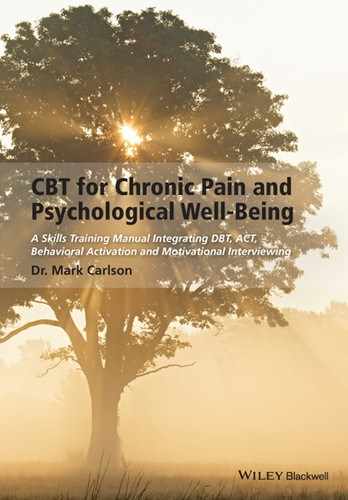Book Description
The first clinical manual of evidence-based CBT skills for managing psychological issues associated with chronic pain, drawn from current approaches such as DBT, ACT, and motivational interviewing.
The first skills training manual in the field of chronic pain and mental health disorders to provide an integrated session-by-session outline that is customizable for clinicians
Adaptive and evidence-based - integrates skill sets from DBT, ACT, Behavioral Activation, and Motivational Interviewing to address the unique needs of individual chronic pain sufferers
Clinicians can import the approach into their work, selecting the most appropriate skills and sessions, or create an entire therapeutic program with the manual as its foundation
Includes invaluable measurement and tracking tools for clinicians required to report outcomes
Table of Contents
- Title page
- Copyright page
- Dedication
- Acknowledgments
- Chapter 1: Introduction to Comorbid Mental Health and Chronic Pain
- Chapter 2: Treatment Organization, Outline, and Structure of the Program
- Chapter 3: Clinical Manual for TAG Program
- Biological Curriculum
- Psychological Curriculum
- Session focus: Orientation to change
- Session focus: Readiness to change
- Session focus: Depression
- Session focus: Anxiety
- Session focus: First step toward change
- Session focus: Anger management
- Session focus: Attending to distress
- Session focus: Meaning and pain
- Session focus: Stress management
- Session focus: Defense mechanisms and coping styles
- Session focus: Stigma
- Session focus: Chemical abuse
- Session focus: Lifespan issues
- Session focus: Managing flare-ups
- Social Curriculum
- Chapter 4: Handouts and Homework
- Goal Setting Handout
- Goal Setting Homework
- Skills Implementation Plan
- Building a Routine Handout
- Maintaining a Sleep Hygiene Routine Handout
- Sleep Hygiene Homework
- Baseline Assessment Form Handout
- Baseline Assessment Form Homework
- Self-Advocacy Homework (Medical Comprehensiveness)
- My Story – Part 1
- My Story – Part 2
- Behavior Chain Analysis
- Keep It Real Handout
- Keep It Real Homework
- Preparing for an Appointment Handout
- Control vs Influence Homework
- Readiness to Change Handout
- Scheduling Positive Events Homework
- Pleased Homework
- First Step toward Change Homework
- Beliefs about Anger Homework
- Managing Conflict Homework
- Attributions Homework
- Finding Meaning and Purpose Homework
- Guided Imagery Handout (Holtberg 2013)
- Progressive Muscle Relaxation Handout (Holtberg 2013)
- Defense Mechanisms and Coping Styles Handout
- Defense Mechanisms and Coping Styles Homework
- Stigma Homework
- Living Life on Life's Terms Homework
- Chemical Abuse Handout
- Identifying My Developmental Tasks Homework
- Working toward Healthy Development Homework
- Turning Fear and Inactivity into Action and Hope Homework
- Managing Conflict Homework
- The 3 Is Homework
- Individual-Based Problem-Solving Model Homework
- Social-Based Problem-Solving Model
- Barriers to Nurturing Support Systems
- Social Roles in Relationships
- Intimacy in Relationships
- Styles of Interacting Handout
- Styles of Interacting Homework
- Master Skills Sheet
- Appendix
- References
- Index
- End User License Agreement
